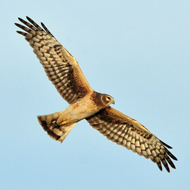New plan to save hen harriers

"This new plan will transform the fate of one of our most magnificent birds."
Defra has published a six-point action plan to save England's iconic hen harrier, which has suffered population declines in recent years.
As well as being a much loved feature of our skies, these birds of prey also make an important contribution to our ecosystem.
The Hen Harrier Action Plan will, for the first time, coordinate the efforts of conservation groups, landowners and wildlife crime officers. Groups will also be encouraged to share best practice to help preserve these birds.
Natural England will lead the plan, working alongside other organisations to:
- Use satellite tagging and tracking to monitor hen harrier numbers in the UK
- Encourage land managers and gamekeepers to provide food for birds of prey
- Analyse intelligence on persecution and deliver better enforcement and deterrents, working alongside the Raptor Persecution Priority Delivery Group
- Monitor and protect nests and winter roosts
- Reintroduce hen harriers to suitable parts of south England
- Consider the feasibility of brood management trials
Some of the above actions, such as monitoring and sharing best practice, are already underway at known nesting sites. Thanks to these measures, nest figures rose from four to six between 2014 and 2015.
Commenting on the plan, environment minister Rory Stewart promised: "This new plan will transform the fate of one of our most magnificent birds.
"We are working closely with conservation organisations and landowners and with their help, this plan will help hen harriers flourish once more while coexisting with a thriving rural economy."



 The Veterinary Medicines Directorate (VMD) is inviting applications from veterinary students to attend a one-week extramural studies (EMS) placement in July 2026.
The Veterinary Medicines Directorate (VMD) is inviting applications from veterinary students to attend a one-week extramural studies (EMS) placement in July 2026.